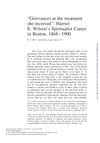May 2021 in “Kahramanmaraş Sütçü İmam Üniversitesi Tıp Fakültesi Dergisi” Most women undergoing chemotherapy experience hair loss, and many cope by using wigs or bonnets.
 24 citations,
December 2014 in “International Journal of Molecular Medicine”
24 citations,
December 2014 in “International Journal of Molecular Medicine” Eclipta alba extract helps increase hair growth and decrease hair loss-related protein in mice.
 1 citations,
January 2022 in “Faculty reviews”
1 citations,
January 2022 in “Faculty reviews” The best long-lasting results in treating hair loss may be achieved through combination therapy, including treatments like finasteride, minoxidil, and platelet-rich plasma injections.
 2 citations,
December 2013 in “Cancer Research”
2 citations,
December 2013 in “Cancer Research” Some early breast cancer patients have long-term hair loss after chemotherapy, especially older and postmenopausal women.
 31 citations,
January 2014 in “Journal of endocrinological investigation”
31 citations,
January 2014 in “Journal of endocrinological investigation” Woodhouse-Sakati syndrome often causes sexual development issues, hair loss, learning disabilities, deafness, muscle contractions, limb pain, and diabetes.
15 citations,
June 2020 in “The journal of investigative dermatology/Journal of investigative dermatology” Mice with extra human KLK14 had hair and skin problems, including weaker cell bonds and inflammation, linked to Netherton syndrome.
 15 citations,
August 2008 in “Toxicology Letters”
15 citations,
August 2008 in “Toxicology Letters” High doses of minoxidil can harm marmoset hearts and kidneys, possibly affecting humans similarly.
 13 citations,
January 2021 in “RSC chemical biology”
13 citations,
January 2021 in “RSC chemical biology” Wnt activation shows promise for regenerative medicine but requires selective targeting to minimize risks like cancer.
 27 citations,
April 2017 in “British Journal of Dermatology”
27 citations,
April 2017 in “British Journal of Dermatology” Hair loss involves immune responses, inflammation, and disrupted signaling pathways.
 September 2019 in “Journal of Investigative Dermatology”
September 2019 in “Journal of Investigative Dermatology” Scientists used stem cells to create a model of the skin disease Epidermolysis Bullosa simplex, which helped them understand its molecular mechanisms and could aid in finding treatments.
 4 citations,
October 2000 in “Contraception”
4 citations,
October 2000 in “Contraception” The right dosage of CPA and TB can work as a safe and reversible male contraceptive in monkeys.
 9 citations,
May 2012 in “British Journal of Dermatology”
9 citations,
May 2012 in “British Journal of Dermatology” Reversing female hair loss.
 11 citations,
May 2011 in “World Journal of Pediatrics”
11 citations,
May 2011 in “World Journal of Pediatrics” The document emphasizes the importance of correctly identifying and classifying genetic hair disorders to help diagnose related health conditions.
 January 2024 in “Journal of Material Cycles and Waste Management”
January 2024 in “Journal of Material Cycles and Waste Management” Adding human hair to cement can make it tougher and better insulated but also more porous.
25 citations,
May 1972 in “Canadian journal of zoology” Black-tailed deer have four types of pelages and molt twice a year.
 1 citations,
October 1996 in “Journal of Cutaneous Medicine and Surgery”
1 citations,
October 1996 in “Journal of Cutaneous Medicine and Surgery” Gene therapy shows promise for treating skin disorders and cancer, but faces technical challenges.
 10 citations,
September 2020 in “Computational and Mathematical Methods in Medicine”
10 citations,
September 2020 in “Computational and Mathematical Methods in Medicine” Researchers developed an algorithm for self-diagnosing scalp conditions with high accuracy using smart device-attached microscopes.
 20 citations,
November 2019 in “Current Opinion in Systems Biology”
20 citations,
November 2019 in “Current Opinion in Systems Biology” The document concludes that computational models are useful for understanding immune responses and could improve cancer immunotherapy.
 275 citations,
March 1999 in “Journal of The American Academy of Dermatology”
275 citations,
March 1999 in “Journal of The American Academy of Dermatology” Chemotherapy can cause various skin reactions, with hair loss being the most common, and proper diagnosis and treatment of these reactions are important.
 1 citations,
April 2012 in “American Literary History”
1 citations,
April 2012 in “American Literary History” Harriet E. Wilson had a challenging career as a spiritualist in Boston, facing competition and possible racism.
 14 citations,
January 2012 in “International Journal of Dermatology”
14 citations,
January 2012 in “International Journal of Dermatology” A woman got a rare condition called oleoma after cellulite treatment, which left scars even after treatment.
 1 citations,
July 2020 in “Journal of Biomedical Translational Research”
1 citations,
July 2020 in “Journal of Biomedical Translational Research” Raccoon dogs can adapt well to life with three legs after forelimb amputation.
 February 2022 in “Research Square (Research Square)”
February 2022 in “Research Square (Research Square)” High TSPEAR levels in colorectal cancer predict worse outcomes.

Black hair's diversity in patterns and textures is influenced by follicle shape and keratin, and it holds cultural, artistic, and mathematical significance.
 21 citations,
June 1990 in “British Journal of Dermatology”
21 citations,
June 1990 in “British Journal of Dermatology” Systemic retinoids are effective for psoriasis but have side effects; benefits may outweigh risks, especially when reducing cancer risks from other treatments.
 21 citations,
January 1988 in “Stress Medicine”
21 citations,
January 1988 in “Stress Medicine” Stress affects skin health and emotional well-being should be considered in skin disease treatment.
 32 citations,
July 2017 in “Wiley Interdisciplinary Reviews-Developmental Biology”
32 citations,
July 2017 in “Wiley Interdisciplinary Reviews-Developmental Biology” Transit-amplifying cells are crucial for tissue repair and can contribute to cancer when they malfunction.
 10 citations,
January 1994 in “Advances in pharmacology”
10 citations,
January 1994 in “Advances in pharmacology” New drugs targeting DNA enzymes show promise for cancer treatment but have side effects like immune system suppression and hair loss.
 35 citations,
January 2012 in “The Journal of Sexual Medicine”
35 citations,
January 2012 in “The Journal of Sexual Medicine” Androgen Deprivation Therapy for prostate cancer often reduces sexual function but intermittent therapy may be more tolerable.
 4 citations,
May 2011 in “Movement Disorders”
4 citations,
May 2011 in “Movement Disorders” A woman's unique dementia was misdiagnosed, a genetic mutation increases Parkinson's risk with age, and finasteride may help with Tourette syndrome.


























